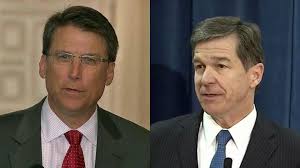Battle for the Governorship: North Carolina
Legal Planet: Environmental Law and Policy 2016-11-05

Governors’ races don’t get as much publicity as the national contests. But we live in a federalist system, and states help shape environmental and energy policy. They can cooperate with and even go beyond federal policy, or they can drag their feet and litigate against every federal initiative.
This time around, there are three races that are considered very close: Indiana, North Carolina and New Hampshire. This is the second of a trio of posts covering those elections.
The North Carolina race pits incumbent Governor Pat McCrory (R) against Roy Cooper (D), the state’s Attorney General. McCrory worked at Duke Energy before becoming mayor of Charlotte and then Governor. His campaign website doesn’t have an issues tab, but it does have one called “Results,” touting his achievements as Governor. Among those achievements he lists:
*Challenged overreaching EPA power regulations to protect NC families from higher electric prices
*Fought the Obama administration to protect North Carolina’s waterways for our farmers
Roy Cooper, the challenger, applauds the state’s role as a “leader in renewable energy technology and that energy companies are shifting toward more sustainable power supplies than coal.” He says he has supported efforts “like North Carolina’s Clean Smokestacks Act,” which he “used to limit TVA’s pollution in our mountains, and the Renewable Energy Portfolio Standard.” Addressing an issue of local importance, he says “coal ash cleanup should move forward quickly and effectively in line with what the science and public health officials recommend to ensure the integrity of our water supply and waterways.”
In short, there is a sharp contrast between McCrory and Cooper on environmental issues. As the Raleigh News & Observer explains, “while McCrory has championed deregulation, Cooper has built his political career in the legislature and as attorney general promoting environmental and consumer safeguards.”
In the past few cycles, Republicans have gained a powerful grip on state governments, with predictable implications for environment and energy policy there. Races like North Carolina’s will determine whether that trend continues.